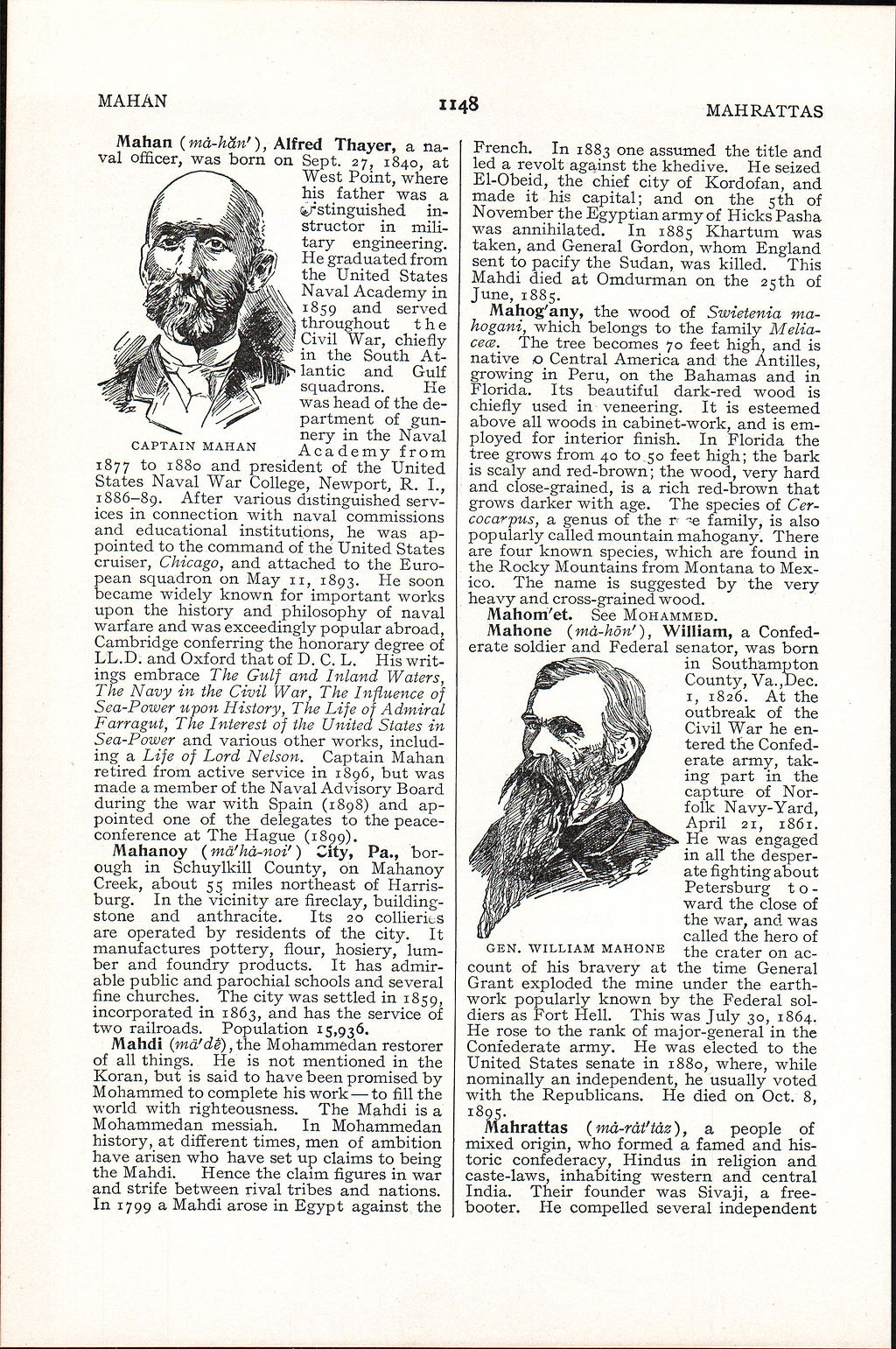MAHAN
1148
MAHRATTAS
CAPTAIN MAHAN
Mahan (ma-h&n'}, Alfred Thayer, a naval officer, was born on Sept. 27, 1840, at West Point, where his father was a (eTstinguished instructor in military engineering. He graduated from the United States Naval Academy in 1859 and served throughout the Civil War, chiefly in the South Atlantic and Gulf squadrons. He was head of the department of gunnery in the Naval Academy from 1877 to 1880 and president of the United States Naval War College, Newport, R. L, 1886-89. After various distinguished services in connection with naval commissions and educational institutions, he was appointed to the command of the United States cruiser, Chicago, and attached to the European squadron on May n, 1893. He soon became widely known for important works upon the history and philosophy of naval warfare and was exceedingly popular abroad, Cambridge conferring the honorary degree of LL.D. and Oxford that of D. C. L. His writings embrace The Gulf and Inland Waters, The Navy in the Civil War, The Influence of Sea-Power upon History, The Life of Admiral Farragut, The Interest of the United States in Sea-Power and various other works, including a Life of Lord Nelson. Captain Mahan retired from active service in 1896, but was made a member of the Naval Advisory Board during the war with Spain (1898) and appointed one of the delegates to the peace-conference at The Hague (1899).
Mahanoy (mafha-noif) City, Pa., borough in Schuylkill County, on Mahanoy Creek, about 55 miles northeast of Harris-burg. In the vicinity are fireclay, building-stone and anthracite. Its 20 collieries are operated by residents of the city. It manufactures pottery, flour, hosiery, lumber and foundry products. It has admirable public and parochial schools and several fine churches. The city was settled in 1859, incorporated in 1863, and has the service of two railroads. Population 15,936.
Mahdi (ma'de), the Mohammedan restorer of all things. He is not mentioned in the Koran, but is said to have been promised by Mohammed to complete his work — to fill the world with righteousness. The Mahdi is a Mohammedan messiah. In Mohammedan history, at different times, men of ambition have arisen who have set up claims to being the Mahdi. Hence the claim figures in war and strife between rival tribes and nations. In 1799 a Mahdi arose in Egypt against the
French. In 1883 one assumed the title and led a revolt against the khedive. He seized El-Obeid, the chief city of Kordofan, and made it his capital; and on the 5th of November the Egyptian army of Hicks Pasha was annihilated. In 1885 Khartum was taken, and General Gordon, whom England sent to pacify the Sudan, was killed. This Mahdi died at Omdurman on the 25th of June, 1885.
Mahog'any, the wood of Swietenia ma-hogani, which belongs to the family Melia-cecB. The tree becomes 70 feet hign, and is native o Central America and the Antilles, growing in Peru, on the Bahamas and in Florida. Its beautiful dark-red wood is chiefly used in veneering. It is esteemed above all woods in cabinet-work, and is employed for interior finish. In Florida the tree grows from 40 to 50 feet high; the bark is scaly and red-brown; the wood, very hard and close-grained, is a rich red-brown that grows darker with age. The species of Cer-co car pus, a genus of the r ~e family, is also popularly called mountain mahogany. There are four known species, which are found in the Rocky Mountains from Montana to Mexico. The name is suggested by the very heavy and cross-grained wood. Mahom'et. See MOHAMMED. Mahone (md-hon'), William, a Confederate soldier and Federal senator, was born in Southampton County, Va.,JDec. i, 1826. At the outbreak of the Civil War he entered the Confederate army, taking part in the capture of Norfolk Navy-Yard, April 21, 1861. He was engaged in all the desperate fighting about Petersburg t o -ward the close of the war, and was called the hero of the crater on account of his bravery at the time General Grant exploded the mine under the earthwork popularly known by the Federal soldiers as Fort Hell. This was July 30, 1864. He rose to the rank of major-general in the Confederate army. He was elected to the United States senate in 1880, where, while nominally an independent, he usually voted with the Republicans. He died on Oct. 8, 1895.
Mahrattas (ma-ratftaz), a people of mixed origin, who formed a famed and historic confederacy, Hindus in religion and caste-laws, inhabiting western and central India. Their founder was Sivaji, a freebooter. He compelled several independent
GEN. WILLIAM MAHONE
